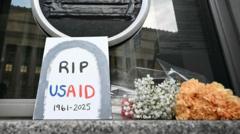Global health experts have issued urgent warnings regarding the severe consequences of the United States’ recent decision to freeze funds allocated to the United States Agency for International Development (USAID). The funding halt, part of a sweeping overhaul under President Trump's administration, could jeopardize vital health initiatives and disrupt services essential for disease control in vulnerable regions worldwide.
The freeze comes amid a broader review intended to align USAID’s spending with Trump's "America First" agenda, a move that critics argue undermines global health security. This decision halts billions of dollars in funding for various international programs, particularly those combatting infectious diseases, humanitarian crises, and health initiatives for disadvantaged populations.
Dr. Tom Wingfield, an expert from the Liverpool School of Tropical Medicine, emphasizes the far-reaching implications of these cuts, asserting that they threaten critical services for TB, HIV, and other health issues. He stated that the decision could lead to increased disease spread and ultimately result in unnecessary fatalities due to the lack of care and treatment facilities.
Many organizations, particularly non-governmental organizations (NGOs), which implement and manage these programs are already struggling to cope with the sudden funding interruption. Frontline AIDS, a collaborative network operating across 100 countries, has reported that more than 20 of its partners are being severely impacted, with some halting life-saving HIV treatment and testing services, risking lives of the most vulnerable individuals, including children.
Prof. Peter Taylor from Sussex University highlighted the adverse effects on trust and morale in communities that rely on these aid programs. His statement underscores the concern that these sudden cuts not only harm direct health services but also erode community confidence in external support, exacerbating existing vulnerabilities.
Experts further assert that the freeze will hinder ongoing clinical drug trials, particularly those related to vital conditions like malaria and HIV, potentially leading to significant delays in treatment advancements. This could result in an avoidable resurgence of diseases that were previously under control.
Consequentially, the sheer scale of USAID’s funding - covering up to 40% of global development aid, including health, education, and economic initiatives - indicates that prolonged inaction could catalyze a rise in preventable diseases and healthcare crises worldwide, creating risks not just for individual nations but for global health stability as a whole.
As the situation develops, the international community remains watchful, emphasizing the urgent need for robust health initiatives that protect and support public health in a world increasingly interconnected by shared threats.





















